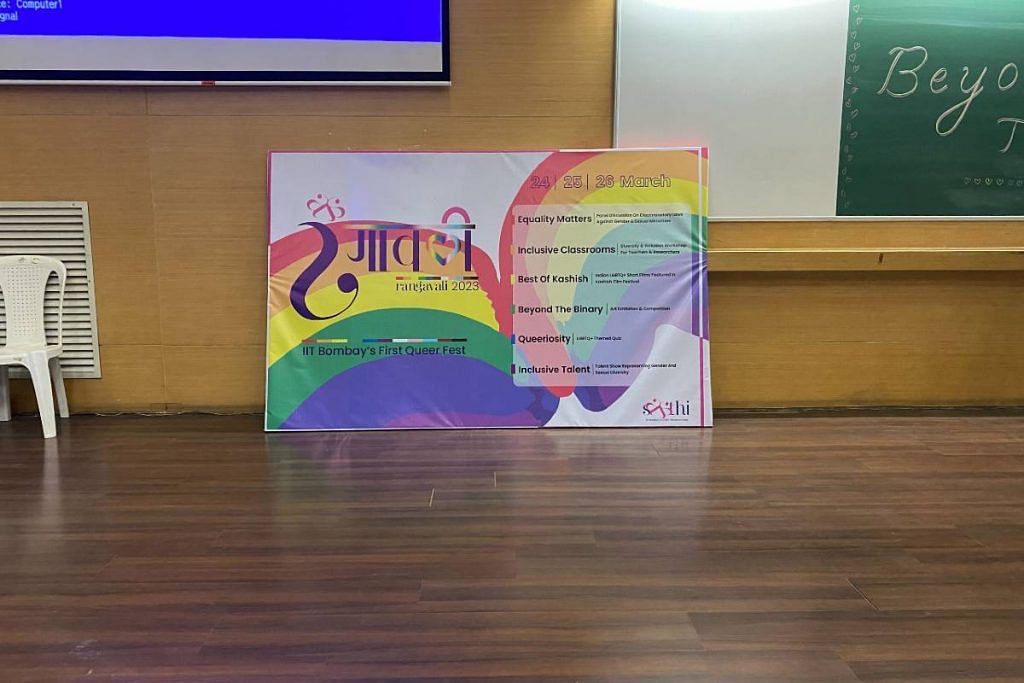Mumbai: A heart in shades of pink, a boy wearing a skirt — inside a hall situated in the midst of tall buildings at the Indian Institute of Technology in Bombay (IIT-B), 40-50 young people gathered Saturday in a large space decorated with colourful balloons and poured their thoughts out onto white paper.
“I am making art beyond the binary. In my painting, one person is wearing a gown. Through this, I want to say that clothes do not tell the gender of a person. Clothes are genderless,” said 21-year-old Ankit Thakur, who studies psychology at University of Mumbai.
Ankit was at the institute with two friends who took part in the art competition as well. They made jokes, made new friends, and painted.
Part of the LGBTQIA community, they were attendees at IIT Bombay’s first queer festival, which was organised on campus over the course of Friday, Saturday and Sunday by the institute’s queer resource group, Saathi.
Ankit and his friends learnt about the festival, Rangavali, via Instagram.
Discussing the problems faced by the queer community, one of the members of Saathi told ThePrint: “It feels so good that we have some space where we can openly be ourselves and talk. Outside of this circle, gaining acceptance is hard. Sometimes I think people just do not understand or do not want to understand (issues of gender and identity). By organising such events, we are trying to change that and create a space for ourselves.”
Founded in 2011, Saathi — the oldest LGBTQIA body at any of the IITs — has been working for years to provide a voice to queer students on the IIT-Bombay campus.
Its first queer festival at the institute saw programmes ranging from film screenings to quizzes, a talent show and poster-making competition, as well as talk sessions with LGBTQIA icons.
“On Friday, we screened short films related to the LGBTQIA community and also invited Indian filmmaker Sridhar Rangayan. Discussions with students were held,” said Nikhil Bhardwaj, convener of Saathi, adding that the group has 215 members, and that it helps connect students with counsellors as well.
On Saturday afternoon, the controversial film Joyland, made in Pakistan on the subject of transgender rights, was screened at the institute as part of Ashank Desai Centre for Policy Studies’ workshop Atelier: Talking Policy Through Cinema. When the students came out of the auditorium after watching it, there were many expressions on their faces — some were emotional, some angry, and some sad.
“It is important to talk about (sexual identity) issues. A person has the right to choose their sexuality and a better society will be built only when we allow such freedom,” one of the students who watched the film told ThePrint, not wishing to be named.
The movie had generated controversy in Pakistan and the fest organisers said they had to struggle to get it screened.
Also read: Where are India’s queer parents? Having a family is not even an option for many Indians
‘Took a lot of work’
According to Bhardwaj, “around 40-50 people were present at every programme, which is believed to be a good number on weekends”.
“We have been a part of such fests in other IITs and we thought that we should organise something like this here too. It took a lot of effort but it seems to be working,” he added.
Regarding the attitude of people on campus, members of Saathi say that there has been some change, but there was still a lot of scope for improvement.
“As people are outside, so are they inside campus. We are working to break their perceptions (about the queer community). Many people do not accept queer people as people of society but attitudes are changing. However, some remain against the community,” said Khushi Gosalia, overall coordinator of Saathi.
Many queer students told ThePrint that it was not easy being themselves in an institute with a majority of male students and a masculine energy-dominated environment.
“I am straight but I feel there should be awareness about this issue, so I am associated with Saathi. However, if my batchmates see me here, they will make fun of me for days,” said a student, Ajit, who recently joined Saathi.
Many of the festival’s attendees, who were from different institutions, called the effort commendable. “Right now, it is happening at a small level but in the coming time we hope the event will be bigger,” one of them said.
For Saathi, organising the event was not easy. “We have been conducting events and talks in between, but for this three-day fest, many permissions and funds were required. For the next round, we will demand more funds so that we can organise on a larger scale,” said Bhardwaj.
(Edited by Nida Fatima Siddiqui)
Also read: Delhi University is the new battleground for queer students—stigma, suppression and suicide
